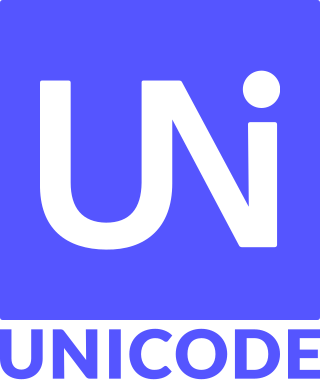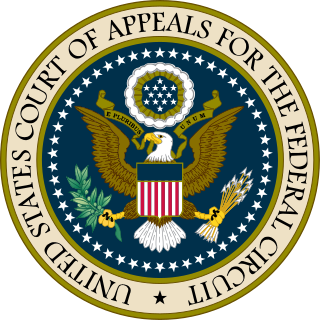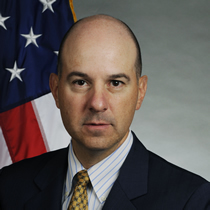A software patent is a patent on a piece of software, such as a computer program, libraries, user interface, or algorithm.

The Unicode Consortium is a 501(c)(3) non-profit organization incorporated and based in Mountain View, California, U.S. Its primary purpose is to maintain and publish the Unicode Standard which was developed with the intention of replacing existing character encoding schemes which are limited in size and scope, and are incompatible with multilingual environments.
An emoji is a pictogram, logogram, ideogram, or smiley embedded in text and used in electronic messages and web pages. The primary function of modern emoji is to fill in emotional cues otherwise missing from typed conversation as well as to replace words as part of a logographic system. Emoji exist in various genres, including facial expressions, expressions, activity, food and drinks, celebrations, flags, objects, symbols, places, types of weather, animals and nature.
The software patent debate is the argument about the extent to which, as a matter of public policy, it should be possible to patent software and computer-implemented inventions. Policy debate on software patents has been active for years. The opponents to software patents have gained more visibility with fewer resources through the years than their pro-patent opponents. Arguments and critiques have been focused mostly on the economic consequences of software patents.
State Street Bank and Trust Company v. Signature Financial Group, Inc., 149 F.3d 1368, also referred to as State Street or State Street Bank, was a 1998 decision of the United States Court of Appeals for the Federal Circuit concerning the patentability of business methods. State Street for a time established the principle that a claimed invention was eligible for protection by a patent in the United States if it involved some practical application and, in the words of the State Street opinion, "it produces a useful, concrete and tangible result."
Business method patents are a class of patents which disclose and claim new methods of doing business. This includes new types of e-commerce, insurance, banking and tax compliance etc. Business method patents are a relatively new species of patent and there have been several reviews investigating the appropriateness of patenting business methods. Nonetheless, they have become important assets for both independent inventors and major corporations.

Ars Technica is a website covering news and opinions in technology, science, politics, and society, created by Ken Fisher and Jon Stokes in 1998. It publishes news, reviews, and guides on issues such as computer hardware and software, science, technology policy, and video games.
Gottschalk v. Benson, 409 U.S. 63 (1972), was a United States Supreme Court case in which the Court ruled that a process claim directed to a numerical algorithm, as such, was not patentable because "the patent would wholly pre-empt the mathematical formula and in practical effect would be a patent on the algorithm itself." That would be tantamount to allowing a patent on an abstract idea, contrary to precedent dating back to the middle of the 19th century. The ruling stated "Direct attempts to patent programs have been rejected [and] indirect attempts to obtain patents and avoid the rejection ... have confused the issue further and should not be permitted." The case was argued on October 16, 1972, and was decided November 20, 1972.
Freeman-Walter-Abele is a now outdated judicial test in United States patent law. It came from three decisions of the United States Court of Customs and Patent Appeals—In re Freeman, 573 F.2d 1237, In re Walter, 618 F.2d 758 ; and In re Abele, 684 F.2d 902 —which attempted to comply with then-recent decisions of the Supreme Court concerning software-related patent claims.

In re Bilski, 545 F.3d 943, 88 U.S.P.Q.2d 1385, was an en banc decision of the United States Court of Appeals for the Federal Circuit (CAFC) on the patenting of method claims, particularly business methods. The court affirmed the rejection of the patent claims involving a method of hedging risks in commodities trading, as non-patentable subject matter. Most importantly, the Court concluded, that machine-or-transformation test "was proper test to apply to determine patent-eligibility of process", and that the “useful, concrete and tangible result” of State Street Bank v. Signature Financial Group and AT&T Corp. v. Excel Communications, Inc. should no longer be relied upon.
The Journal of the Patent and Trademark Office Society is a quarterly peer-reviewed law journal covering intellectual property law. It was established in 1918.

David "Dave" J. Kappos is an attorney and former government official who served as Under Secretary of Commerce for Intellectual Property and Director of the United States Patent and Trademark Office (USPTO) from 2009 to 2013. Kappos is currently a partner at New York law firm Cravath, Swaine & Moore.
Bilski v. Kappos, 561 U.S. 593 (2010), was a case decided by the Supreme Court of the United States holding that the machine-or-transformation test is not the sole test for determining the patent eligibility of a process, but rather "a useful and important clue, an investigative tool, for determining whether some claimed inventions are processes under § 101." In so doing, the Supreme Court affirmed the rejection of an application for a patent on a method of hedging losses in one segment of the energy industry by making investments in other segments of that industry, on the basis that the abstract investment strategy set forth in the application was not patentable subject matter.

Pile of Poo (💩), also known informally as the poomoji (slang), poop emoji, or poo emoji, is an emoji resembling a coiled pile of feces, usually adorned with cartoon eyes and a large smile. Originated from Japan, it is used as an expression of various contexts. Some possible uses include: as a response of passive aggressive emotion, for comedic value, as commentary on what's bad, or as its literal meaning.
Google LLC v. Oracle America, Inc., 593 U.S. ___ (2021), was a U.S. Supreme Court decision related to the nature of computer code and copyright law. The dispute centered on the use of parts of the Java programming language's application programming interfaces (APIs) and about 11,000 lines of source code, which are owned by Oracle, within early versions of the Android operating system by Google. Google has since transitioned Android to a copyright-unburdened engine without the source code, and has admitted to using the APIs but claimed this was within fair use.
CyberSource Corp. v. Retail Decisions, Inc., 654 F.3d 1366, is a United States Court of Appeals for the Federal Circuit case that disputed patent eligibility for the '154 patent, which describes a method and system for detecting fraud of credit card transactions through the internet. This court affirmed the decision of United States District Court for the Northern District of California which ruled that the patent is actually unpatentable.
Alice Corp. v. CLS Bank International, 573 U.S. 208 (2014), was a 2014 United States Supreme Court decision about patent eligibility of business method patents. The issue in the case was whether certain patent claims for a computer-implemented, electronic escrow service covered abstract ideas, which would make the claims ineligible for patent protection. The patents were held to be invalid, because the claims were drawn to an abstract idea, and implementing those claims on a computer was not enough to transform that abstract idea into patentable subject matter.
Android Marshmallow is the sixth major version of the Android operating system developed by Google, being the successor to Android Lollipop. It was announced at Google I/O on May 28, 2015, and released the same day as a beta, before being officially released on September 29, 2015. It was succeeded by Android Nougat on August 22, 2016.

Android Nougat is the seventh major version and 14th original version of the Android operating system. First released as an alpha test version on March 9, 2016, it was officially released on August 22, 2016, with Nexus devices being the first to receive the update.

The Eggplant emoji (🍆), also known by its Unicode name of Aubergine, is an emoji featuring a purple eggplant. Social media users have noted the emoji's phallic appearance and often use it as a euphemistic or suggestive icon during sexting conversations, to represent a penis. It is frequently paired and often contrasted with the peach emoji (🍑), representing the buttocks.







